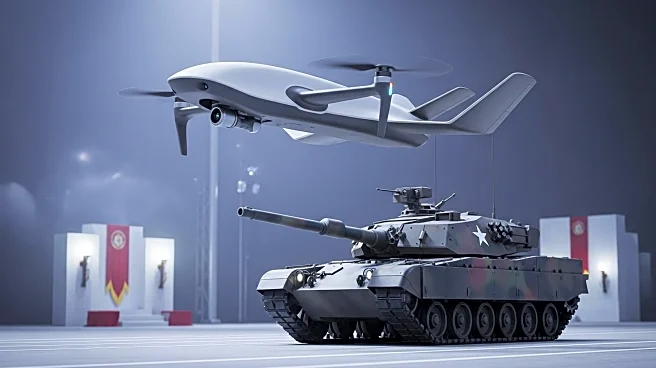What's Happening?
China is conducting a major military parade in Beijing, showcasing its advanced military hardware, including missiles, fighter jets, and strategic weapons. This event marks the 80th anniversary of Japan's World War II surrender and aims to instill national pride and demonstrate China's military capabilities. President Xi Jinping, who leads the Communist Party and the military, will deliver a speech at the parade. The event features troops marching in formation and warplanes flying overhead, with many of the weapons displayed publicly for the first time. The parade is highly choreographed and controlled, with barriers keeping the public at a distance and commercial buildings along the route closed.
Why It's Important?
The parade highlights China's growing military strength, which has raised concerns among its Asian neighbors and the United States. The display of advanced weaponry serves as a reminder of China's increasing capabilities in strategic warfare, potentially impacting regional security dynamics. The absence of U.S. and Western European leaders, along with those from Japan, India, and South Korea, underscores geopolitical tensions. However, the presence of leaders from North Korea, Russia, and Iran indicates China's strengthening ties with these nations. The event reflects China's efforts to assert its position as a global military power, influencing international relations and defense strategies.
What's Next?
The parade may lead to heightened diplomatic discussions and strategic assessments among global powers, particularly those concerned about China's military expansion. Countries in the Asia-Pacific region might reassess their defense postures and alliances in response to China's display of military prowess. The event could also prompt further military collaborations between China and its allies, such as Russia and North Korea. Observers will likely monitor China's future military developments and international engagements closely, as the parade signals its intent to maintain a strong defense posture.
Beyond the Headlines
The parade's tightly controlled nature and the absence of public spectators highlight China's approach to managing national events and public perception. The focus on military strength may also reflect internal priorities, emphasizing security and stability amid global uncertainties. Additionally, the event's timing, coinciding with historical commemorations, underscores China's narrative of resilience and recovery from past conflicts, shaping its national identity and foreign policy outlook.








